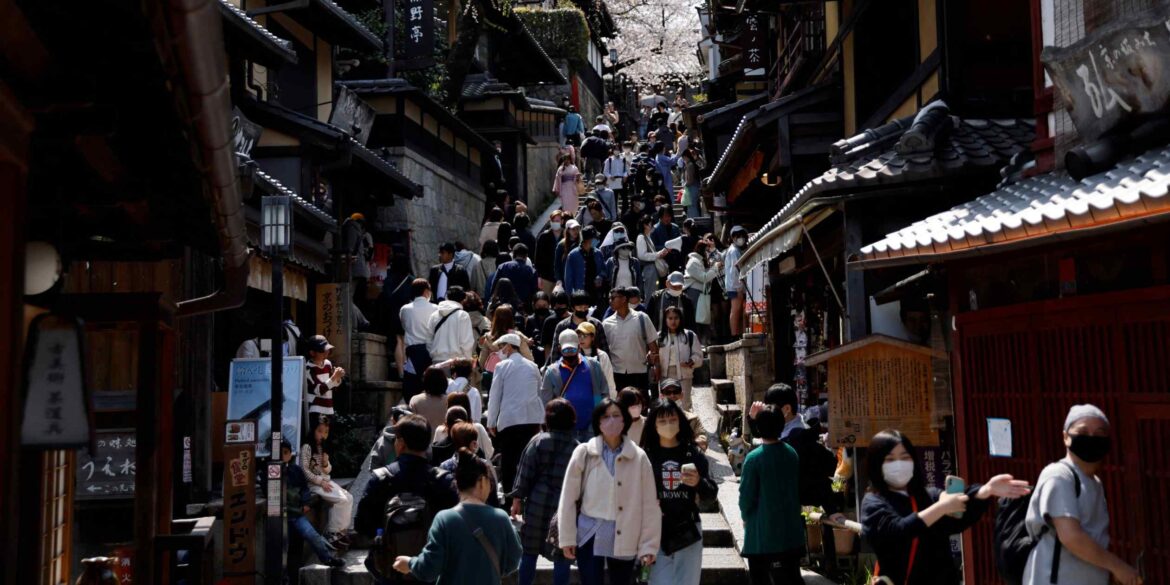KYOTO, Japan — The municipal government of Kyoto said Tuesday that it will raise hotel lodging taxes to as much as 10,000 yen ($63) per night, as the city looks to counter the effects of overtourism with increased spending on infrastructure projects.
A proposed amendment to the tax ordinance will be submitted to Kyoto’s city council next month. The higher taxes would be applied on March 1, 2026 following approval from Japan’s internal affairs minister.
The new maximum rate, applying to rooms priced at 100,000 yen or more per night, would be the highest in the nation. The higher lodging taxes are projected to bring in roughly 12.6 billion yen, or $80 million, per year — more than double the current receipts.
Kyoto Mayor Koji Matsui said the funds from the tax will go beyond tourism promotion and will be allocated to projects that would benefit locals. Targets will include infrastructure development such as roads and bridges, as well as disaster response.
“I want the citizens to tangibly feel that taking in tourists will improve their daily lives,” said Matsui.
Kyoto currently welcomes 50.28 million visitors each year, including those that do not stay overnight. The city faces an urgent need to expand measures to combat the negative effects of overtourism, such as crowded buses and traffic congestion.
The revenue from Kyoto’s lodging taxes amounted to 5.2 billion yen during the previous fiscal year, the highest since the taxes were first introduced in 2018. The funds are currently being used for beautification projects, such as removing utility poles and preserving Kyoto’s traditional wooden townhouses. The tax revenue also funds trash collection at tourist spots.
The city currently enforces three lodging tax brackets based on the price of accommodation, with the highest being a 1,000 yen levy incurred for rooms costing at least 50,000 yen per night per person.
The new tax schedule will have five tiers. At the low end, rooms priced at below 6,000 yen will incur a 200 yen tax, while at the high end, rooms costing at least 100,000 yen will be subjected to the maximum tax of 10,000 yen.
Some in the accommodations industry have expressed concern about the impact of the new taxes.
“This may lead to [price sensitive] Japanese people refraining from travel,” said one industry source.
But the general view is that the taxes will have a limited effect on tourist traffic.
“There isn’t a huge upswell of opposition that would involve the industry as a whole,” said Shigeki Kitahara, advisor to the Kyoto Prefecture Ryokan Association, an industry group of hotels and inns.
“Even looking overseas, there are almost no cases where the number of tourists has decreased due to an increase in the lodging tax,” said Yuichi Yamada, executive director at the Japan Travel Bureau Foundation think tank.
Underpinning this view is the fact that hotel room rates already fluctuate significantly based on demand.
Kyoto’s average room rate was 28,686 yen in November, according to the Kyoto City Tourism Association, which is up about 4,000 yen from a year earlier. Both inflation and a surge in international tourists have fueled the upswing, so the impact of the higher lodging tax hike is not likely to be noticeable.
According to current estimates, there are 2,000 to 3,000 rooms in Kyoto that cost 100,000 yen or more per night. Some observers believe that travelers paying upwards of 100,000 yen for a room would not typically mind a 10,000 yen tax.
“They may just see it as within the margin of error,” said Yamada.
Nationwide, 11 local governments including Tokyo have imposed lodging taxes, according to the internal affairs ministry. The resort city of Atami will introduce its own taxes in April, and Osaka will raise its tax rate by up to 200 yen as soon as this year.


AloJapan.com